ARTICLE AD BOX
Basillioh Rukanga
BBC News, Nairobi

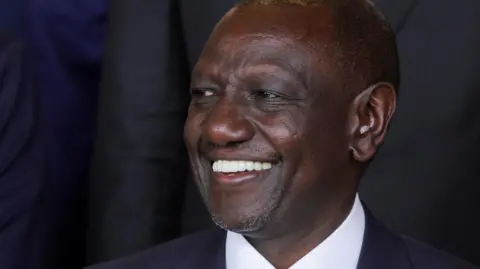 Reuters
Reuters
Kenya's President William Ruto is a man of many nicknames.
Deputy Jesus, El Chapo, Hustler and Chicken Seller are just some that he has acquired in recent years.
As is often the case when people are given alternative monikers, some are affectionate but some are intended to mock and reflect a profound anger.
A history of the president's aliases offer a window into how the perception of him has changed.
Ruto has acknowledged the rechristening trend, joking recently that Kenyans are "finishing" him with the numerous labels.
"You have given me so many names. I had the name William Kipchirchir Samoei Ruto. You added Survivor… Zakayo... now you are at Kasongo (the title of a Congolese song about abandonment and heartbreak). Will you stop at ten, or should I prepare for more?" he recently asked.
The crowd, at a rally in the capital, Nairobi, responded that they had yet more.
Before he was elected president in 2022, Ruto attracted handles that bolstered his reputation as a man of the people.
Hustler - Kenyan parlance for someone eking out a living against the odds - helped portray him as someone who would prioritise the needs of the struggling folk.
Chicken Seller, referring to his childhood when he hawked poultry on the roadside, resonated with many who saw his life as an epitome of their own.
"These were very positive [names]. They sold him to the public in terms of votes," political analyst Prof Herman Manyora told the BBC arguing that they helped catapult him into the top job.
"Names really stick with Ruto," he added.

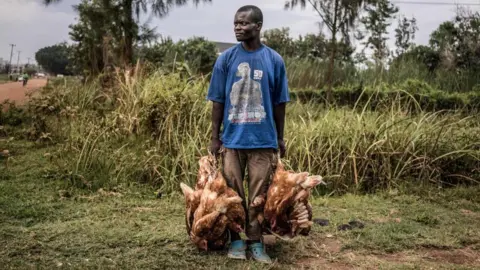 AFP / Getty Images
AFP / Getty Images
Ruto gained a reputation among Kenyans struggling to get by that he understood their plight
But the president has been a high-profile figure in Kenyan politics for a long time, including serving as deputy president for nine years up until 2022, and has never been far from controversy.
Prof Manyora recalls the label Arap Mashamba – which translates as "son of farms" – coined just under a decade ago and relates to Ruto's ownership of vast tracts of land across the country. Concerns have been raised about how some of these have been acquired.
In 2013, a court ordered Ruto to surrender a 100-acre (40-hectare) farm and compensate a farmer who had accused him of grabbing it during the 2007 post-election violence. He denied any wrongdoing.
Ruto's penchant for quoting Bible verses also earned him the Deputy Jesus tag.
However, it is since his rise to the presidency that the nickname manufacturers have been working overtime – with at least a dozen being created - and they have become increasingly critical.
One that has stood out is Zakayo - Swahili for the name Zaccheaus, a Biblical figure who is portrayed as a greedy tax collector who climbed a tree to see Jesus.
- The ‘tax collector’ president sparking Kenyan anger
- BBC identifies security forces who shot Kenya anti-tax protesters
Ruto's government ntroduced a raft of unpopular taxes and many Kenyans began to say that he had betrayed the "hustlers".
"He failed to deliver after becoming president," Prof Manyora said.
The pain of paying more taxes, and a perception that the extra money will be wasted, is often the focus many conversations.
Last year, young people came out onto the streets of Nairobi for weeks of protests, which turned deadly, against a fresh government proposal to raise taxes that was later dropped.

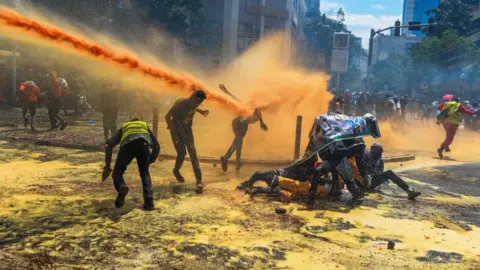 Anadolu / Getty Images
Anadolu / Getty Images
Last year's anti-tax protests galvanised young people angry at the government over the state of the economy
The chant "Ruto must go" became a rallying call for the demonstrators and now Must Go has become another way to refer to the leader.
The creative christeners have also focussed on the allegation that the president enjoys foreign travel.
Hence the title Vasco da Ganya – a play on the name of the 15th Century Portuguese explorer, Vasco da Gama, and the Swahili word danganya, which means "to lie".
Ruto's honesty has also been called into question with Kaunda Uongoman, which mimics late Congolese musician Kanda Bongoman.
The first part refers to the president's love for the Kaunda suit - a safari jacket with matching trousers – and Uongoman, which incorporates the Swahili word uongo, meaning "lies".
But the president seems impervious to this volley of verbal attacks.
Government spokesman Isaac Mwaura said the manifold nicknames "don't raise concerns" in the office of the president but simply "capture how people view a person".
Ruto is "very hands on and doing his best to transform the economy... It's normal for any leader to have many nicknames as this signifies his various attributes and initiatives as a leader", he told the BBC.
Mwaura also argued that in spite of the Zakayo nickname, the government has had to raise taxes to pay for new projects, reduce the budget deficit and fix the economy.
Nevertheless, when people have gone beyond inventing new names and used satire and forms of art to ridicule the president, there has been a negative reaction from officials.
Some cartoons and AI-generated images, including showing the president in a casket, have been described as "reckless" and "distasteful".
Some of the alleged producers of this online content have been victims of abductions. This, Prof Manyora said, should been seen as a sign of intolerance by the government.
Lachon Kiplimo, a 23-year-old university student, said that while he supported the president, some of the promises he has made are sometimes "unrealistic", which fuels the nicknames.
He cited the use of El Chapo, referring to the former Mexican drug lord, after Ruto promised a machine that would produce a million chapatis (also known as chapo in Kenya) every day to feed schoolchildren in the capital.

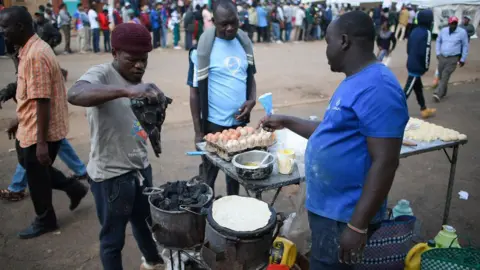 AFP / Getty Images
AFP / Getty Images
A chapati - a popular street food in Kenya - is also known as a chapo
Mr Kiplimo however reckons that the way the president brushes off the monikers, and in fact seems to embrace them, shows how strong he is.
Prof Manyora believes the young people who come up with the alternative labels for the president do it as a form of catharsis, a way of releasing tension.
This view is backed up by 24-year-old student Margaret Wairimu Kahura, who said that many Kenyans "are in a lot of pain".
She feels that the mockery is a way of letting Ruto know how the youth are feeling.
She says that no other Kenyan president has been subjected to this level of lampooning, and "so this is unique [but] in a bad way".
It is true that previous heads of state had had nicknames but they have not been so numerous.
The last President, Uhuru Kenyatta, was called Kamwana ("young boy"), Jayden (a Kenyan reference to a pampered or lazy child) and Wamashati (for his love of print shirts).
His predecessor, Mwai Kibaki, was known as General Kiguoya (a general who is afraid) and Fence Sitter.
Perhaps the age of social media, with its insatiable appetite for new content to keep people amused has increased the trend towards name calling.
But for many, like Ms Kahura, the volume of nicknames for Ruto are a genuine reflection of "the different problems that people are facing".
You may also be interested in:

 Getty Images/BBC
Getty Images/BBC

 6 hours ago
2
6 hours ago
2

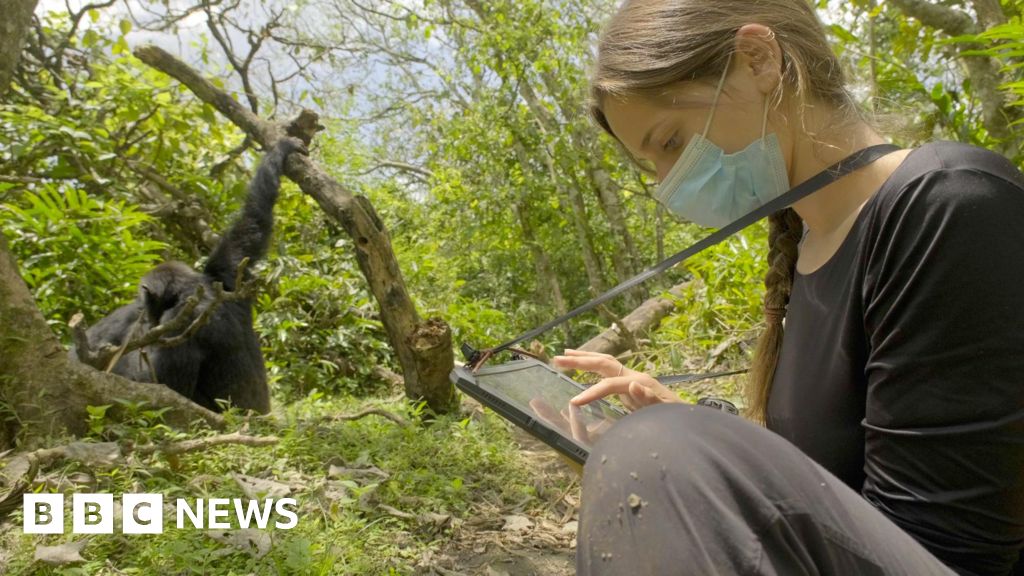






 English (US) ·
English (US) ·